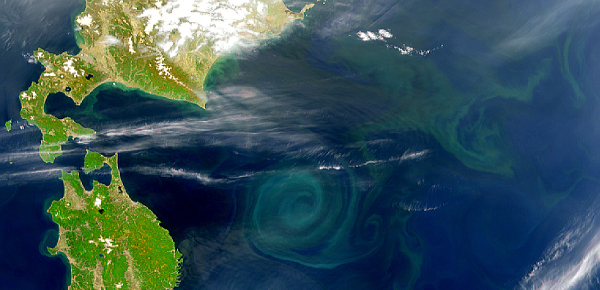Earth’s complex life origins revealed by single event

University of Bristol researcher Patricia Sanchez-Baracaldo has identified the catalyst that allowed the evolution of complex life on Earth. Up to 800 million years ago, oceans had almost no oxygen at all, but it was the work of microorganisms, called phytoplankton, who were capable of performing photosyntesis and therefore made oxygen production possible.
Phytoplanktons covering two thirds of our planet, set the stage to create transformation by producing large amounts of oxygen, made possible to create the life we know today. Oceans fully oxygenated at around up to 800 million years ago, when atmospheric oxygen reached today's concentrations. Photosynthesis, which is mass oxygen production requiring energy from the Sun, carbon dioxide and water, had itself evolved already on the planet about 2.7 billion years ago, has raised questions for the scientists, why it took almost 2 billion years to reach modern concentrations of oxygen.
Nevertheless, it has been long known that cyanobacteria were the first microorganisms able to produce oxygen, which made possible evolution of animals and creation of Earth System, what we know today.
Sanchez-Baracaldo, Royal Society Research Fellow, from the School of Geographical Sciences at the University of Bristol, whose research was published in Scientific Reports used genomic data to trace back the origin and revealed the various different types of marine planktonic form evolved relatively late, around 800 to 500 million years ago, possibly arising from freshwater and/or marine benthic ancestors.
However, cyanobacteria dominated only terrestrial and coastal environments early on, having low impact on nutrient cycles. After, when bacteria colonized properly the oceans, became planet-altering event possible.
Dr Sanchez-Baracaldo said: "The results of this large-scale phylogenomic study imply that, early on, terrestrial cyanobacteria capable of building microbial mats dominated the ecology of the Early Earth."
"Rather surprisingly, marine planktonic cyanobacteria are relatively young, only evolving just prior to the origin of complex life – animals. By producing oxygen in vast quantities, these cyanobacteria enabled the development of complex life in our oceans. These biological events are linked – they help explain why it took so long for complex life to evolve on our planet. Cyanobacteria needed to colonize the oceans first."
"This study shows that several factors contributed to the delay of the oxygenation of the Earth's oceans. Firstly, cyanobacteria evolved in freshwater habitats and not in marine habitats as previously thought, and, second marine productivity had a huge boost when cyanobacteria were finally able to colonize marine habitats, this allowed for the production of oxygen and carbon burial at unprecedented levels."
"The genomic revolution has hugely improved our understanding of the tree of life of cyanobacteria. Without cyanobacteria, complex life on our planet as we know it simply would not have happened," said Dr. Sanchez-Baracaldo.
- Reference:
"Origin of marine planktonic cyanobacteria" – Patricia Sanchez-Baracaldo – Scientific Reports – December 1, 2015 – DOI:10.1038/srep17418
Featured image: A bacterial bloom. Image provided by the SeaWiFS Project. NASA/Goddard Space Flight Center and ORBIMAGE.

Commenting rules and guidelines
We value the thoughts and opinions of our readers and welcome healthy discussions on our website. In order to maintain a respectful and positive community, we ask that all commenters follow these rules:
We reserve the right to remove any comments that violate these rules. By commenting on our website, you agree to abide by these guidelines. Thank you for helping to create a positive and welcoming environment for all.